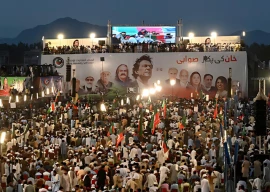
The village provides a magnificent view of the historic Attock Fort, built by the Mughal Emperor Akbar. One is caught in a deluge of imagination looking at the fort from this crossing, where for centuries Indian generals anxiously looked for Central Asian and Afghan invaders descending onto the Indian plains through the rugged and mountainous northwest.
Now, a casual walk along the tattered streets serves as a reminder that apart from its name, this virtual ghost-town is frozen in time. Poverty is smeared on the face of this small neighbourhood, and the residents’ only pastime seems to be nostalgic discussion over orchids and watermills that have long vanished.
The locality still has a Hindu temple, built in 1893. However it is now serves as the residence of a local school guard who pays a nominal rent to the Auqaf Department. Any explanation for the faded, crumbling walls of the temple in this village where old is slowly being replaced with new seems to be lost in translation.
“For years this temple served as a primary school for the villagers, but after the school shifted to a new building, it was rented by the school chowkidar as a house and he is now living in it,” said Mohammad Anwar, a villager.
He added there were around 45 houses in this village, but most of the old houses were demolished by newcomers who needed more space over the years. Some pre-partition era houses, however, still survive.
Another local named Farooq said his grandfather Juma Khan was among the first to come here. However, to his dismay, they lost their house to someone else in the following years, and had to build a new home.
Recalling his grandfather’s stories about the village, Farooq said that it was a walled town with four gates that were closed after evening.
Faiz, another local, said that this area was government property and locals approached a colonel in the GHQ in the early 60s for permission to live in the houses. The owners of some shops also pay rent to the Auqaf Department.
Sajwal Khan, standing nearby, chimed in saying that Hindus owned most of the businesses in the nearby Khairbad Bazaar.
He narrated a legend involving Purdil Khan, a Pashtun, and his ill-fated adventure to steal a necklace from a Mughal princess living in the Attock Fort.
“Purdil Khan loved Shahi, a Pashtun chieftain’s daughter, and when he asked for her hand, she asked him to bring the necklace of the princess living in the fortress,” he said.
Purdil swam across the Indus River but was caught while scaling the wall of the fort and presented before the princess, who sentenced him to be crushed by an elephant. Upon learning of Purdil’s arrest, Shahi herself went to the princess to offer an explanation.
Purdil was released and the princess gave her necklace to Shahi. However, on their way back, Shahi got thirsty and Purdil was killed by Powendas, Afghan gypsy merchants, who suspected he was a thief when he approached their tent to ask for water for his beloved.
A couplet from Pashto folklore “Akori Pa Midanoona Shahi Rawana De,” or “Shahi is on her on way across the Akora Khattak plains,” immortalizes this sad romance.
The river crossing has a romance of its own, for it was the meeting point of plains and mountains divided by the sacred Indus River. At the crossing, so many shades of history overlap each other that they bewilder visitors.
Perhaps it is fitting that an echo from the past in the form of two cremation points for the Sikhs of the Khyber Agency and Peshawar are under construction on a walking distance from the rechristened Mohallah Hiduwan.
Published in The Express Tribune, February 20th, 2011.




1725670396-0/Untitled-design-(9)1725670396-0-165x106.webp)



1724268870-0/Supreme-Court-of-Pakistan-(2)1724268870-0-270x192.webp)








COMMENTS
Comments are moderated and generally will be posted if they are on-topic and not abusive.
For more information, please see our Comments FAQ